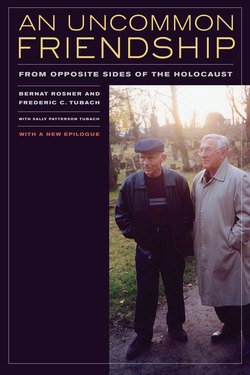Читать книгу An Uncommon Friendship - Bernat Rosner - Страница 7
На сайте Литреса книга снята с продажи.
ОглавлениеForeword
Two European boys from small villages, one Jewish Hungarian and one German, grew up on opposite sides of the deadly divide constructed by Nazi Germany. One barely survived his imprisonment in several concentration camps, while the other attended meetings of the Jungvolk (Pre-Hitler Youth). The father of one was exterminated at Auschwitz, while the father of the other was a counterintelligence officer in the German army. After the war, both youths followed their luck and drive, each in his own way, to leave Europe and cross the Atlantic. The transformative power of the United States liberated them from their particular European fates. It gave them the opportunity to define who they were, with careers and families far from the traumas of their youth. Two Europeans became Americans, even as the turbulence of the past left marks on their souls.
As adults Bernat Rosner and Fritz Tubach met by chance in the San Francisco Bay area and became friends. But it was more than a decade before they began to talk to each other about their pasts and made the decision to record their stories. In order to keep his past life as victim at a distance, Bernie preferred that his story as an Auschwitz survivor be told in the third person, as a narrative by his German friend. The daunting task of writing the story of his Jewish friend helped Fritz confront his own past in Nazi Germany along with that of his family and childhood village. Both Bernie and Fritz believed that their lives in rural Europe before the Holocaust also needed to be revisited for the sake of the dead, the living, and the innocent, and because of the guilty.
Ultimately, both men refused to allow Hitler's agenda to define their lives and prevent their friendship. Their stories are about bridge building; they stand in opposition to the ethnic strife generated by “blood and soil” legacies. In these double memoirs Bernat Rosner attempts to come to terms with a past long suppressed; for Fritz Tubach, there is a search for redemption through narrating the story of one of Nazi Germany's victims together with his own.
But let the two stories, joined here, speak for themselves.
SALLY PATTERSON TUBACH
